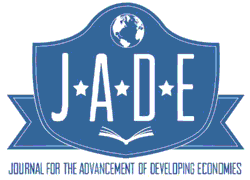Institute for the Advancement of Developing Economies

Journal for the Advancement of Developing Economies
Date of this Version
2021
Document Type
Article
Citation
Journal for the Advancement of Developing Economies 2021 Volume 10 Issue 1, pp. 37-51.
doi 10.32873/unl.dc.jade1013
Abstract
This study analyzed the profit efficiency of smallholder cassava farmers in Enugu state, Nigeria. The study employed a multi-stage random sampling technique in selecting 240 cassava farm households who are registered in the Enugu State Fadama III project during the 2019 farming season. Data were collected using copies of structured questionnaire and interview schedule. Collected data were analyzed using descriptive and inferential statistics (stochastic frontier profit function model). Results showed that the majority (73.3%) of the household heads were male, with a mean age of 52 years. Additionally, the majority (78.5%) of the respondents were married, mean farm size of respondents was 0.3125 ha, mean duration of formal schooling was 9 years, and personal savings was the major (83.1%) source of capital among respondents. The results further showed that profit efficiency ranged between 34.19 and 99.98%, while mean efficiency was 73% with the 27% loss in profit attributed to a combination of technical and allocative inefficiencies. Also, educational level and years of farming experience were the major significant factors which influence profit efficiency positively. Findings from this study could be relevant for policy formulation by government.
Included in
Econometrics Commons, Growth and Development Commons, International Economics Commons, Political Economy Commons, Public Economics Commons, Regional Economics Commons


Comments
Copyright © 2021 Institute for the Advancement of Developing Economies